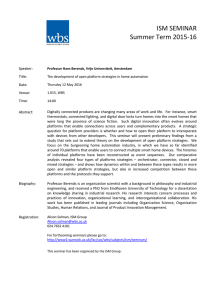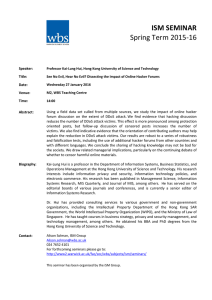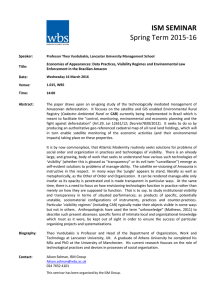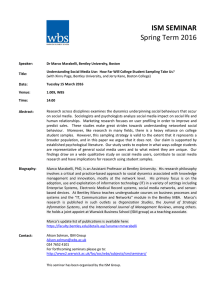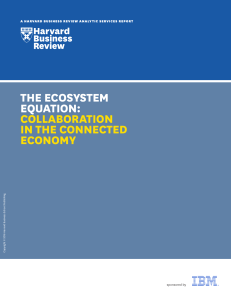ISM SEMINAR Autumn Term 2015-16 Speaker:
advertisement
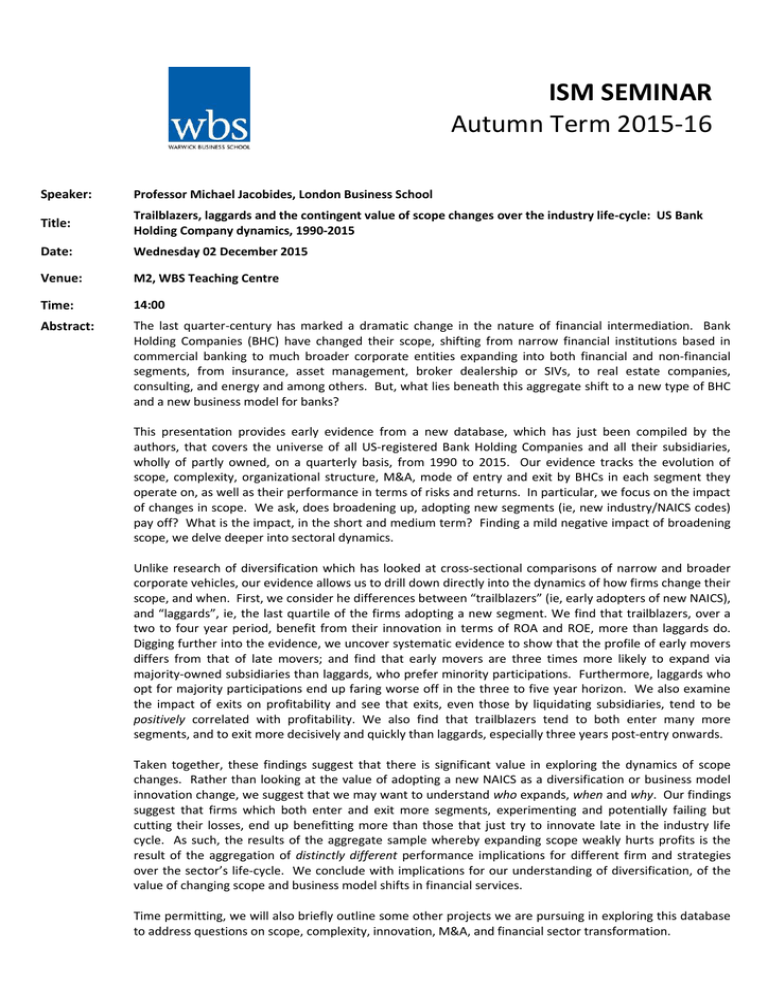
ISM SEMINAR Autumn Term 2015-16 Speaker: Professor Michael Jacobides, London Business School Title: Trailblazers, laggards and the contingent value of scope changes over the industry life-cycle: US Bank Holding Company dynamics, 1990-2015 Date: Wednesday 02 December 2015 Venue: M2, WBS Teaching Centre Time: 14:00 Abstract: The last quarter-century has marked a dramatic change in the nature of financial intermediation. Bank Holding Companies (BHC) have changed their scope, shifting from narrow financial institutions based in commercial banking to much broader corporate entities expanding into both financial and non-financial segments, from insurance, asset management, broker dealership or SIVs, to real estate companies, consulting, and energy and among others. But, what lies beneath this aggregate shift to a new type of BHC and a new business model for banks? This presentation provides early evidence from a new database, which has just been compiled by the authors, that covers the universe of all US-registered Bank Holding Companies and all their subsidiaries, wholly of partly owned, on a quarterly basis, from 1990 to 2015. Our evidence tracks the evolution of scope, complexity, organizational structure, M&A, mode of entry and exit by BHCs in each segment they operate on, as well as their performance in terms of risks and returns. In particular, we focus on the impact of changes in scope. We ask, does broadening up, adopting new segments (ie, new industry/NAICS codes) pay off? What is the impact, in the short and medium term? Finding a mild negative impact of broadening scope, we delve deeper into sectoral dynamics. Unlike research of diversification which has looked at cross-sectional comparisons of narrow and broader corporate vehicles, our evidence allows us to drill down directly into the dynamics of how firms change their scope, and when. First, we consider he differences between “trailblazers” (ie, early adopters of new NAICS), and “laggards”, ie, the last quartile of the firms adopting a new segment. We find that trailblazers, over a two to four year period, benefit from their innovation in terms of ROA and ROE, more than laggards do. Digging further into the evidence, we uncover systematic evidence to show that the profile of early movers differs from that of late movers; and find that early movers are three times more likely to expand via majority-owned subsidiaries than laggards, who prefer minority participations. Furthermore, laggards who opt for majority participations end up faring worse off in the three to five year horizon. We also examine the impact of exits on profitability and see that exits, even those by liquidating subsidiaries, tend to be positively correlated with profitability. We also find that trailblazers tend to both enter many more segments, and to exit more decisively and quickly than laggards, especially three years post-entry onwards. Taken together, these findings suggest that there is significant value in exploring the dynamics of scope changes. Rather than looking at the value of adopting a new NAICS as a diversification or business model innovation change, we suggest that we may want to understand who expands, when and why. Our findings suggest that firms which both enter and exit more segments, experimenting and potentially failing but cutting their losses, end up benefitting more than those that just try to innovate late in the industry life cycle. As such, the results of the aggregate sample whereby expanding scope weakly hurts profits is the result of the aggregation of distinctly different performance implications for different firm and strategies over the sector’s life-cycle. We conclude with implications for our understanding of diversification, of the value of changing scope and business model shifts in financial services. Time permitting, we will also briefly outline some other projects we are pursuing in exploring this database to address questions on scope, complexity, innovation, M&A, and financial sector transformation. Biography: Michael G Jacobides holds the Sir Donald Gordon Chair of Entrepreneurship & Innovation at London Business School and is a Visiting Scholar at the New York Fed. He has visited Harvard, NYU, Bocconi and Wharton, where he obtained his PhD, after studying at Athens, Cambridge and Stanford. He studies industry evolution, new business models, value migration and structural change in firms and sectors. His work has appeared in SMJ, AMJ, AMR, OrgSci, ResPol, and ICC, where he is a co-Editor, and also publishes in HBR, FT and Forbes.com. He works on strategy, among others, with Vodafone, McKinsey, Accenture, PwC, KPMG, Santander, Credit Suisse, and Airbus. On policy, he has worked with the UK parliament (on the future of financial services), the European Council (on the high-level group on innovation in Europe) and has spearheaded the RedesignGreece initiative. He also works with the World Economic Forum, presenting in the regional and Davos Annual meetings. Contact: Alison Solman, ISM Group Alison.solman@wbs.ac.uk 024 7652 4101 For forthcoming seminars please go to: http://www2.warwick.ac.uk/fac/soc/wbs/subjects/ism/seminars/ This seminar has been organised by the iSM Group.
